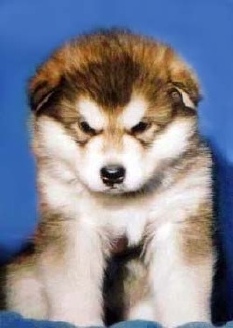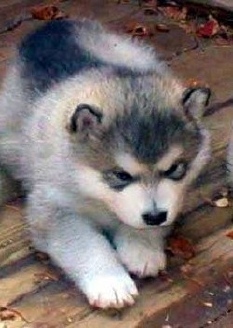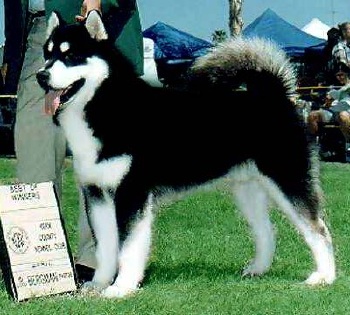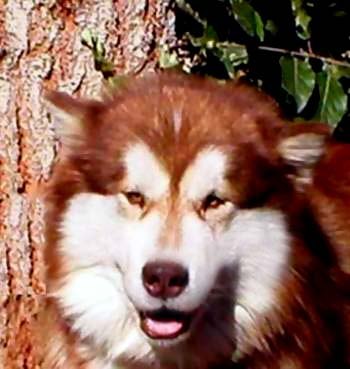A Rainbow of Colors
 Sable |  Gray |  Red |
Snowlion Alaskan Malamutes come in a variety of colors: from light red to brown; seal and
black, various shades of sable as well as gray.
Snowlion Puppies
 Seal |
 Black |
 Sable |
 Red |
 Brown |
 Gray |
 Light gray |
The AKC Alaskan Malamute standard recognizes all these colors as well as solid white.
The primary color designation--gray, red, black, sable, seal-- refers to the undercoat color of the body. The "and
white" part of the color designation refers to the legs and underside of the dog. Any of these colors are acceptable
for the show ring as long as the dog is evenly marked and has no large uneven splashes or piebald spots.
Coat color will change from puppy to adulthood. Many of our gray and white puppies will appear beige-to-light gray at 8 weeks with little to no black evident. Our sable pups will have a pronounced brownish-red undercoat. By 9 months as the adult coat develops, black-tipping will appear on the outer coat, giving the pups a darker grey and black guard coat over a light gray & buff undercoat for the grays and black-tipped guard coat over a brownish coat for the sables. This is a typical progression of color change from puppy to adult coats. Please note this black-tipping on the guard coat does not make the dog a black and white.
Colors and markings are strictly cosmetic; we do not even consider them when selecting pups to keep for our breeding program and sled team.
Temperament, conformation and gait always take priority.
Color Variation
Each of the color categories (with the exception of the true solids: white or black or brown) will vary, since the overall appearance depends on four factors:
- the amount of dark tipping on the outer (guard) coat,
- whether there is an "agouti" pattern of alternating bands of color on guard hairs
- the undercoat which can vary from light to dark gray, cream to biscuit to orange/ brown
- the trimmings--shades of brown along the legs, ears, or backskull
In contrast, the distribution of pigment in the solid colors is more uniform: guard coats and undercoats are similar in color--all white (with some cream or biscuit variation possible); all black, with dark charcoal gray to black undercoat; all brown or mahogany red including the undercoat.
Distinguishing between a Seal and Black & White
 Seal & White |
 Black & White |
At a distance, some seal and white malamutes appear to be black. To distinguish between dark seals and true blacks check the color of the undercoat. True blacks have solid black guard hairs from tip to base, and dark charcoal gray undercoats, where seals have a lighter colored undercoat--cream or light gray. At birth it is not always easy to seperate the dark seals from the "true" black and whites. Many seals will develop silver tipping of the guard coat along the sides and the overall 'black' appearance gradually lightens.
The Sables and the Reds
 Sable & White |
 Red & White |
How to tell them apart? Sables have black noses, eyelids, and a varying amounts of black tipped guard coat. Reds do not have any black pigment: they have liver-colored noses and no black factor in their coats. Both sables and reds come in a variety of shades.
A look at markings
 Open Face |
 Puppy Tai with mascara |
 Tai Adult- Open Face |
Open face malamutes have a 'cap' of color and no other facial
markings. Some malamutes have full masks: both a bar down the nose and goggles under the eyes. Others have only goggles or only a bar. Any of these markings are acceptable for the show ring. Markings and coat colors can lighten or darken as a dog matures.
Full masks
 Seal & White with full mask |
 Black & Mahogany Red full masks |  Seal & white with full mask |
More Markings: bars & goggles
 Gray & White with light goggles |
 Gray & White with Bar |  Gray & White with goggles |
Please keep in mind that a puppy's color or markings should not be the basis for selecting a show, working or companion dog. These traits have no bearing on a dog's personality or performance. We've finished dogs of every color and produced five Best in Show males that were gray, red, and black. Here at Snowlion Kennels, we are 'color blind.'




